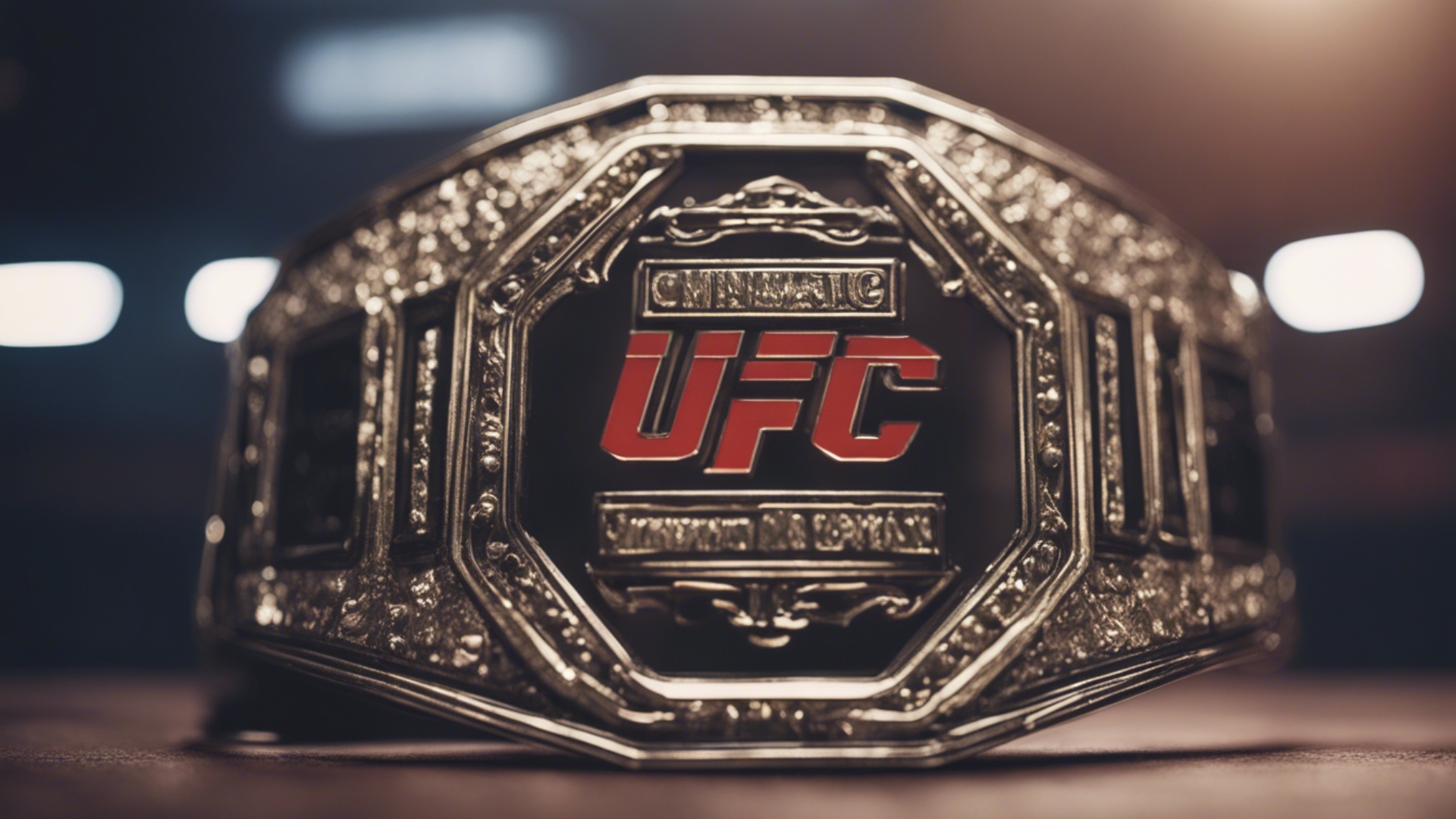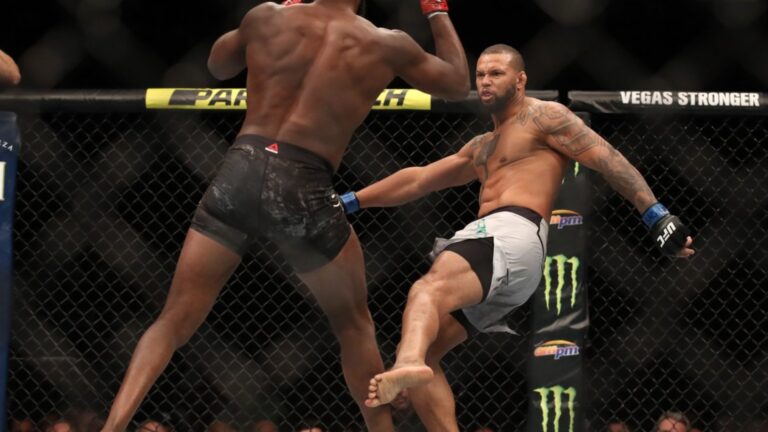
In this article:
UFC titles represent the highest achievement within each weight class. Fighters win titles through championship bouts scheduled by the UFC.
The Ultimate Fighting Championship (UFC) is a premier organization in mixed martial arts (MMA), and holding a UFC title signifies reaching the pinnacle of the sport.
Titles are distributed across various weight divisions, from Flyweight to Heavyweight for men and Strawweight to Featherweight for women.
Champions defend their belts against contenders, who climb the ranks by winning fights and earning their spot through the organization’s matchmaking system.
Title bouts are often the main event of UFC fight cards, drawing substantial attention and highlighting the skill level of the sport’s elite athletes.
UFC fighters aim to become champions with intense training and dedication, symbolizing their dominance and expertise in their respective weight classes.
The management of these titles plays a crucial role in both the fighters’ careers and the promotion’s events, sustaining the competitive spirit and ongoing narrative that keeps fans engaged worldwide.
The Foundation of UFC Championship Titles

In mixed martial arts, UFC championship titles are the pinnacle of success. They symbolize skill, dedication, and superiority within the Ultimate Fighting Championship. Earning one marks a fighter’s place at the top of the sport.
Weight Classes Breakdown
Different weight classes ensure fair and competitive matches. Each class has its title up for grabs. This is how they break down:
- Flyweight: up to 125 lbs
- Bantamweight: 126 to 135 lbs
- Featherweight: 136 to 145 lbs
- Lightweight: 146 to 155 lbs
- Welterweight: 156 to 170 lbs
- Middleweight: 171 to 185 lbs
- Light Heavyweight: 186 to 205 lbs
- Heavyweight: 206 to 265 lbs
From Contender to Champion
A UFC fighter’s journey from contender to champion is thrilling. It demands hard work and winning fights. Here are the steps in the process:
- Impress the matchmakers – Fight well and win.
- Rank up – Climb the official rankings.
- Earn a title shot – Become a top contender.
- Seize the opportunity – Win the championship fight.
Champions defend their titles against top contenders. Dominating a division can lead to legendary status in the UFC.
Navigating the UFC Ranking System
Its ranking system is essential to the Ultimate Fighting Championship (UFC). This complex hierarchy is crucial in determining the contenders for UFC titles.
Understanding this can be as thrilling as the fights themselves. Here, we decode how rankings influence title shots and the surrounding debates that they spark.
Role of Rankings in Title Shots
The UFC ranking system is the backbone of its competitive structure. Rankings factor into who gets to fight for the champion’s belt. Let’s dive into the specifics:
- Fighters are ranked from top contender to number fifteen in each division.
- Victories, performance, and activity push fighters up the ranks.
- Matchmakers consider these ranks when deciding the next title challengers.
Champions and contenders sit atop their division’s pyramid, but the rankings chart the path for emerging talents aiming for gold.
Criticism and Controversies
While rankings serve as a guide, they are not without pitfalls. Critics point out several issues:
- Subjectivity: Rankings can reflect personal bias.
- Marketing Influence: Popular fighters might leapfrog deserving contenders.
- Inconsistency: Criteria for ranking updates can be unclear.
These concerns highlight that rankings aren’t always an exact science. They can lead to debates about the fairness of title-shot selections.
The Journey to a Title Fight
Imagine fighters clashing in the octagon, each aiming for the ultimate prize in UFC: the championship title. The journey to a UFC title fight is a thrilling mix of skill, grit, and strategy.
In this electrifying path, contenders must meet certain criteria, impress matchmakers, and stand out among elite fighters to get their shot at the belt.
Criteria for Earning a Title Shot
Fighters work hard to show they deserve a title fight.
- Winning Streak: Consistent victories push fighters closer to a title shot.
- Exciting Fights: Spectacular performances can jumpstart their journey.
- Ranking: A high rank in the division is crucial.
- Fan Base: A large fan following brings fighters into the spotlight.
- Opportune Timing: Sometimes timing is everything.
The Matchmaking Process
Securing a title shot involves more than just winning fights. It’s about making the right impression.
- Performance Analysis: Matchmakers watch fighters’ past performances.
- Star Power: Fighters with a strong fan base often get priority.
- Division Needs: Title shots depend on the division’s current situation.
- Availability: Fighters must be ready when the opportunity arises.
Anatomy of a Title Bout
When two fighters step into the UFC octagon for a title bout, it’s more than just a fight; it’s a spectacle with layers of intrigue and competition shaped by strict rules and electrifying promotion.
Rules and Regulations
The framework of a UFC title fight is built on a solid foundation of rules designed to ensure fairness and athlete safety. These rules also determine a fighter’s path to compete for the championship.
- Each title bout lasts up to five rounds.
- Fighters must weigh in within their weight class limit.
- Title fights have a championship clause, requiring immediate rematch in case of a draw.
- A win can occur by knockout, submission, or the judge’s decision.
Title contenders are often top-ranked fighters who have consistently proven their skill within the UFC rankings. A crack at the title culminates in a fighter’s hard work and success inside the octagon.
The Significance of Fight Promotion
A title bout isn’t just a contest of strength and skill; it’s an event. The UFC is renowned for creating immense hype, essential for attracting fans and generating buzz.
- Promotion includes press conferences, pre-fight interviews, and social media campaigns.
- Building a storyline around the fighters engages fans and can turn into a must-see event.
- The UFC uses digital and traditional marketing techniques to give each title fight a unique narrative. This includes intense stare-downs and promotional videos teeming with fighter highlights.
- Fight promotions boost ticket sales and drive Pay-Per-View purchases.
Promotion not only sells the fight but also elevates the status of the fighters, particularly the potential champions, to the level of sports celebrities.
What Happens When a Champion Emerges
The world of mixed martial arts thrives on victories and the crowning of champions. In the Ultimate Fighting Championship (UFC), a significant moment is when fighters rise through the ranks to grasp the gold.
Let’s explore this thrilling process and what happens once a UFC fighter becomes a champion.
Belt Awards and Defenses
A newly emerged UFC champion receives the prestigious championship belt, symbolizing supreme achievement in their weight class.
Fans celebrate this event worldwide. Champions now face an important task: defending their title.
- Champions must prepare for a series of defenses against top contenders.
- The frequency of these defenses often depends on the champion’s readiness and match-making decisions.
- Success in title defenses further solidifies a champion’s status.
Title matches are spectacles, with fighters showcasing their best skills. The audience witnesses intense action. Successful defenses create legacies and demand respect from peers and fans alike.
Legacy and Hall of Fame Considerations
Champions who demonstrate excellence and honor in their reign cement their legacy. Title wins and defenses shape the narrative of their careers in the UFC.
A champion’s journey often points toward a singular honor: induction into the UFC Hall of Fame.
- A champion’s career and impact on the sport are assessed.
- Integral fighters with remarkable careers get nominated for the Hall of Fame.
- Fame, skill, and contributions to the sport are critical factors.
The Hall of Fame is an eternal reminder of a fighter’s prowess and dedication. For many, this selection is the ultimate goal, signifying the highest form of recognition.
Interim Titles and Vacancies
In the intense world of the UFC, title belts represent the pinnacle of combat glory. These belts have rich histories and signify true excellence in martial arts.
But what happens when a champion can’t defend their title due to injury or when the belt holder vacates their position?
That’s where interim titles and vacancies come into play, ensuring the competition remains fierce and fans stay engaged.
The Role of Interim Belts
Interim titles serve a unique purpose in the UFC. They ensure top contenders stay active rather than wait for the reigning champ to return. Interim belts provide continuity in the championship lineage, offering fighters a shot at gold.
Interim champions keep divisions moving and maintain fan interest. Fighters holding an interim title often get to unify their belt with the official champions upon their return.
Circumstances Leading to Vacant Titles
Several outcomes can leave a title vacant. A champion might retire, switch weight classes, or fail to meet contractual obligations.
Serious injuries or personal issues that prevent back-to-back defending can strip a fighter of their title.
Competitive integrity remains a core value of the UFC, prompting the elevation of interim belts or the introduction of new champions to fill vacancies.
- Injury: Champions sidelined for prolonged periods.
- Retirement: When a titleholder decides to hang up the gloves.
- Weight class change: Champions moving to different divisions leave titles behind.
- Contractual issues: Failures to meet the UFC’s standards can cause a title loss.
Frequently Asked Questions
How Much Does a UFC Fighter Make If They Win a Title?
A UFC champion’s earnings vary widely, typically including fight purses, win bonuses, pay-per-view shares, and performance bonuses, often exceeding $500,000 per title fight victory.
How Do You Win a UFC Belt?
To win a UFC belt, a fighter must consistently win fights and eventually defeat the current champion in their weight class.
How Do UFC Tournaments Work?
UFC tournaments feature mixed martial artists competing in weight-specific divisions. Fighters must-win bouts to advance and potentially earn title shots.
Event formats vary, including fight nights and numbered events, with main cards headlining top-tier bouts. Match outcomes depend on knockouts, submissions, or judges’ decisions.
Can a UFC title Fight End in a Draw?
Yes, a UFC title fight can end in a draw if the judges score the bout as even, though it is rare.
What Are UFC Titles?
UFC titles are championship belts awarded to fighters who win their respective weight class divisions within the Ultimate Fighting Championship.
How Many UFC Weight Classes Exist?
Twelve UFC weight classes are currently divided among eight for men and four for women.
What is An Interim UFC Title?
An interim UFC title is a temporary championship awarded in a division when the reigning champion cannot compete.
How Does One Earn a UFC Title Shot?
Fighters earn UFC title shots based on their ranking, fight record, and performances in the Octagon, as decided by the UFC.
Can UFC Champions Switch Weight Classes?
Yes, UFC champions can switch weight classes, but they must vacate their current title to compete for another.
How Often Are UFC Titles Defended?
UFC titles are typically defended at least once yearly, but the frequency can vary based on the champion’s activity and division.
Conclusion
Understanding UFC titles can enhance your appreciation of the sport. It helps grasp the fighter’s hard-earned achievements. Remember, each belt symbolizes the pinnacle of mixed martial arts success.
Keep following the action for the most thrilling title bouts. Stay engaged as legends rise in the Octagon!






